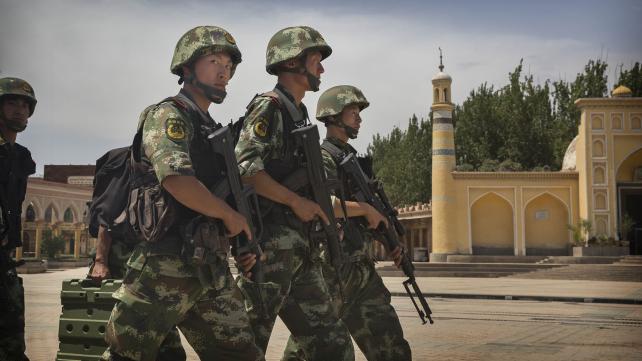
While 10% to 30% of all Uighurs in China’s northwestern province of Xinjiang are now in concentration camps, those outside also face incredible suffering and discrimination. Many are surviving by declaring themselves Communists who have renounced Islam. Some have joined the police. Others use bribery, obedience, and appeasement to keep out of the concentration camps. Several thousand have fled from China to other countries. Here is a glimpse of life in Xinjiang outside of the camps.
Culture: No Salam
-
Saying Salam, the Islamic greeting is forbidden
-
Uighur-language education has been banned
-
Uighur festivals are banned
-
Facial recognition technology is everywhere, so people avoid passing by a mosque or a religious person’s home
-
Uighurs cannot hold Islamic weddings at home. Chinese authorities reward up to USD $7,500 for whistle-blowers to report this
Food: No halal
-
Halal is banned in Uighur areas.
-
One must explain why s/he is not eating pork
-
Uighur-owned shops are forced to sell alcohol and pork
Cell Phone: Don’t use
-
Uighur Muslims must install a spyware application on their devices called Jingwang Weishi (Web Cleansing Guard) that permits the government to monitor their activity
-
If one installs the spyware but stops using the mobile, it is a sure way to the concentration camp
The Family Spy: Must report
-
Uighur households are divided into groups of 10 in order to monitor each other and report on “security issues” to government officials, forcing people to spy on each other for fear of repercussion
-
Chinese government workers are in one million Uighur Muslim homes as “guests” to monitor them
Livelihood: Forced Labor
-
Forced labor is mandatory for Uighurs
-
Chinese authorities confiscate the farmland and property of Uighurs and redistribute it to Chinese Communists
-
As a rule, Uighur restaurants are the only ones covered with Chinese flags as well as photos of President Xi Jinping or plates bearing his image, depicting “ethnic harmony”
Travel: No Free movement
-
There are 90,000 new security posts, 500 yards apart in cities
-
A person would be forced to stop and have his ID checked seven times while travelling just less than three miles on his motorcycle
-
Each Uighur car must be fitted with tracking devices
-
Passports of Uighurs are confiscated
-
Uighurs cannot travel within China without passes
Sources of this information:
There are three sources of information:
1. Chinese government websites, which until recently, had published most of the information publicly. Now they have started removing it from their websites.
2. Interviews with those freed from the concentration camps thanks to pressure from the Kazakhstan government, as well as interviews with the relatives of those who live abroad. I have met many of those relatives and learned from their stories
3. Satellite images of the concentration camps. Initially, the Chinese denied their presence. But now they say these are “re-education” camps. Human Rights Watch and other human rights organizations have documented all of these allegations.
Visit SaveUighur.org



Add new comment